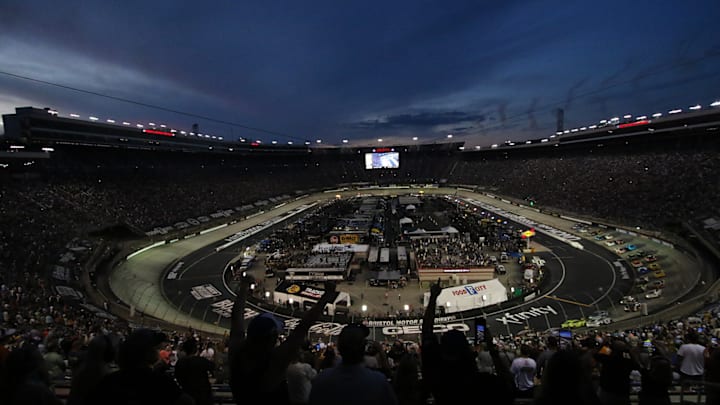CHRISTIE: Night Race at Bristol Didn't Live Up to the Hype

There was a race at Bristol Motor Speedway on Saturday night, where the winner would be awarded a big trophy. However, nobody got the memo aside from Kyle Larson, it seemed. The Hendrick Motorsports driver put in one of the most dominant performances in the modern era of the NASCAR Cup Series as he led 462 laps, the most laps led at Bristol since Cale Yarborough led 495 laps in a race there in 1977, on his path to the win.
As Larson stomped the field in the Bass Pro Shops Night Race, the 500-lap race failed to deliver on the hype surrounding it, and ultimately, the momentum built on the back of a wild spring race at Bristol, where tire wear was a massive factor, was snuffed out on a night where just about nothing happened.
In what can only be described as one of the biggest letdowns in recent memory, only 10 cars finished on the lead lap, and Larson had second-place Chase Elliott nearly half a lap down as he won the race by 7.088 seconds at a track where laps can be cranked out in 15 to 16 seconds. Aside from Corey LaJoie crashing out in his final race with Spire Motorsports after contact from Josh Berry on Lap 329, there was not much to write home about following the NASCAR Cup Series Playoffs Round of 16 elimination race.
Sadly, we should have expected this outcome as short track racing, at least in the Next Gen era, has overwhelmingly underwhelmed. Not even the "drama" of the race serving as a Playoff elimination event could save the lackluster everyone-follow-everyone parade charading as a race.
Hell, Martin Truex Jr., the second-place car was flagged for speeding on pit road on a pit stop under caution at Lap 332. Truex would drop from second to 24th as a result of the penalty. Over the next 168 laps, the car that had previously been running in the runner-up spot, couldn't gain one position. Not one. Truex finished 24th and would be one of the four drivers eliminated from the NASCAR Cup Series Playoffs.
If the product at short tracks continues to mirror what was on display on Saturday night at Bristol Motor Speedway, the question becomes why are we even going to short tracks in the NASCAR Cup Series? And that is a scary, and dangerous question. Short tracks are vitally important to the NASCAR Cup Series. The sport was founded on good, hard short track racing. Its fanbase wants short track racing, but it wants competitive short track racing, and what we've been seeing in the NASCAR Cup Series is patently not that.
To its credit, NASCAR has tried throwing things at the Next Gen car in hopes of fixing what has ailed the show on short tracks. They've attempted numerous aerodynamic tweaks, which didn't produce much difference. They've tapped Goodyear to come up with tire compounds that fall off more, which is great when Goodyear achieves the desired result such as they did in the spring at Bristol. That benchmark was not met on Saturday night, and the race suffered.
But the blame can't all be heaved onto Goodyear's shoulders. At the crux of it all is the fact that the Next Gen car simply doesn't race well at short tracks, which is what necessitated Goodyear to be tasked with finding different tire compounds.
Something needs to change with the car, but what?
Seemingly everything involving the Next Gen car has been tweaked and changed in an effort of chasing a better overall product on the short tracks in the NASCAR Cup Series. Everything, except boosting the horsepower levels to pre-Next Gen era levels. NASCAR has been hesitant to increase horsepower in the Next Gen car, but if nothing else is working, it seems like it's time to give it a shot. The show can't get any worse at this point.

Toby Christie is the Editor-in-Chief of Racing America. He has 15 years of experience as a motorsports journalist and has been with Racing America since 2023.
Follow toby_christie